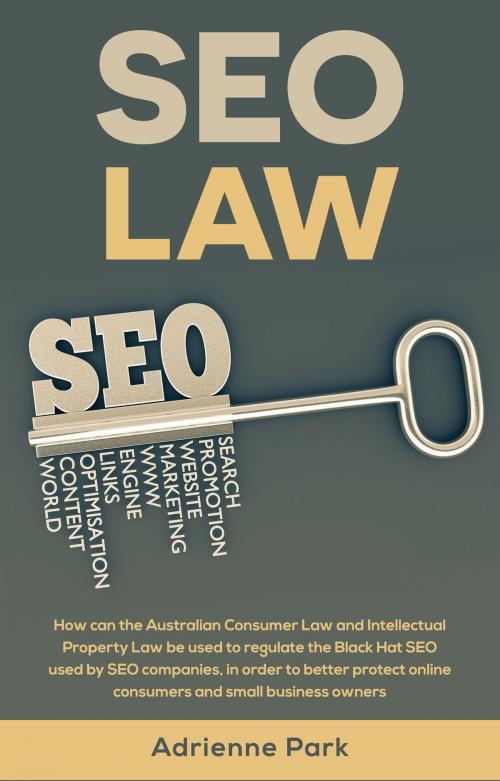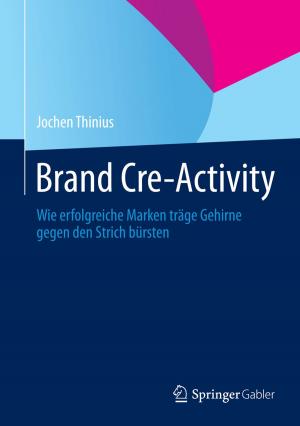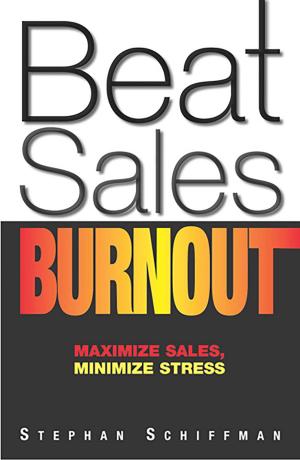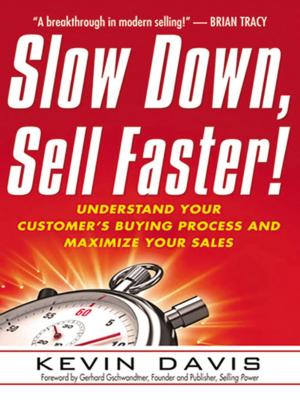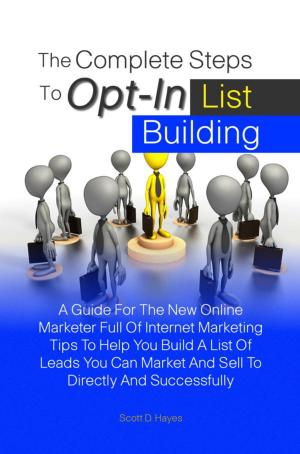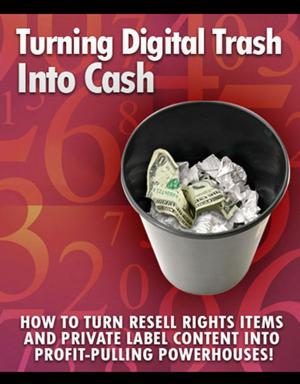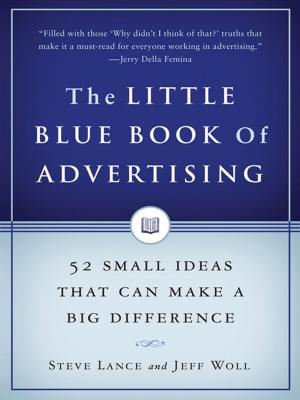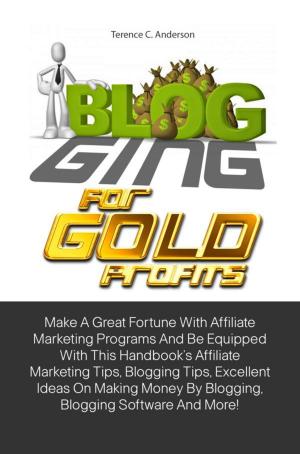SEO LAW
Search Engine Optimzation Law
Business & Finance, Marketing & Sales, Advertising & Promotion, Sales & Selling| Author: | Adrienne Park | ISBN: | 1230001518627 |
| Publisher: | Adrienne Park | Publication: | January 24, 2017 |
| Imprint: | Language: | English |
| Author: | Adrienne Park |
| ISBN: | 1230001518627 |
| Publisher: | Adrienne Park |
| Publication: | January 24, 2017 |
| Imprint: | |
| Language: | English |
Google published the Search Engine Optimisation Starter Guide, which recommended the use of meta tags since Google might use them as snippets for website pages.[1] The meta tags[2] include meta titles, meta descriptions and meta keywords which are positioned in between the opening
and before the closing in the HTML code.[3] In general, keywords, trademarks and popular products or services of the business are included in the meta title, meta description and meta keywords.[4] Jani McCutcheon said that there are inherent opportunities to abuse meta tags.[5] For instance, some businesses put the keywords of competitors in their meta tags to attract more visitors. They also put irrelevant keywords about products or services that they do not provide to increase website traffic or sales of products.[6] These behaviours are considered to be misleading or deceptive conduct.[7]
In Lift Shop Pty Ltd v Easy Living Home Elevators Pty Ltd ('Lift Shop Case'),[8] Lift Shop Pty Ltd ('Lift Shop') and Easy Living Home Elevators ('Easy Living') were direct competitors in the elevator industry. Easy Living hired a SEO marketing firm to modify it’s website and improve it’s Google ranking using SEO. The SEO firm asked Easy Living to choose five keywords and Easy Living chose the keyword 'lift shop'. Lift Shop argued that Easy Living appeared in the same SERP as them and alleged that using the keyword. 'Lift Shop', amounted to misleading or deceptive conduct under section 18 of the ACL and was also a trademark infringement. The court dismissed the application and stated that the keyword 'Lift shop' was used as a description, not a trademark. Justice Buchanan rejected the plaintiff’s allegations that the defendant took part misleading and deceptive conduct as consumers could distinguish the plaintiff’s business from the different URLs of the defendant’s website. Also websites contained different title and description. To be captured under section 18 of the ACL, the plaintiff must prove that the other party engage in conduct that is misleading or deceptive or is likely to mislead or deceive. In this case, the plaintiff failed to prove there was anything to suggest any association between the two businesses.
-------------------------------------------------------------------------------------------------------------------------------------------------------------
[1] Andrew Robertson and Michael Tilbury, Divergences in Private Law (Bloomsbury Publishing, 2016) 103. A snippets is a text excerpt, an image or a screenshot of a website which contains and displays information about pages or websites. Rich snippets tend to contain targeted keyword phrases without keywords stuffing.
[2] Authors, Leanne Wiseman, et al stated in the Australian Intellectual Property Law that although internal users cannot see the meta tags, users rely on them to identify websites. In the past, meta tags only existed for search engines to perform search queries and for webmasters to increase their Google position but they are now also used as indicators for users to quickly identify websites at first glance.
[3] The recommended of length of the meta-title is 69 characters which includes the spaces and the ideal length of the meta description is 160 characters.[3]
[4] Holly Mann, Honest Riches (Lulu.com, 2008) 93-98. Content Management Systems (CMS) allow users to add, update and edit contents of site without needing HTML coding. There are many types of CMS such as WordPress, Drupal, Joomla, Moodle, Geeklog, Zen Cart, PhpBB and etc. Nowadays, people create websites with Content Management System (‘CMS’) platforms.[4] Among CMS platforms, WordPress[4] is the most popular for web beginners to start with as it provides easy to install SEO plugins[4] such as Yoast SEO[4] and All in One.[4] By using these plugins people are not required to know HTML codes since they automatically put the codes into the right position.
[5] Jani McCutcheon, 'Search and ye shall infringe? Current issues concerning the use and abuse of trade marks in cyberspace', (2006) 17 AIPJ 99.
[6] Complete Technology Integrations Pty Ltd v Green Energy Management Solutions [2011] FCA 1319; ACCC v Trading Post Australia Pty Ltd & Google Inc [2011] FCA 1086. In ACCC v Trading Post Australia Pty Ltd & Google Inc, Trading Post used the competitor's keywords the head (meta title) of Google AdWords, and was sued for the breach of the misleading and deceptive conducts.
[7] Lift Shop Pty Ltd v Easy Living Home Elevators Pty Ltd [2014] FCAFC 75. Lift Shop sued the Easy Living for the misleading and deceptive conduct under s 18 of the Australian Consumer Law and trade mark infringement.
[8] Lift Shop Pty Ltd v Easy Living Home Elevators Pty Ltd [2014] FCAFC 75.
-------------------------------------------------------------------------------------------------------------------------------------------------------------
More information is avilable at : http://www.jinslegalstory.com/seo-law/
Google published the Search Engine Optimisation Starter Guide, which recommended the use of meta tags since Google might use them as snippets for website pages.[1] The meta tags[2] include meta titles, meta descriptions and meta keywords which are positioned in between the opening
and before the closing in the HTML code.[3] In general, keywords, trademarks and popular products or services of the business are included in the meta title, meta description and meta keywords.[4] Jani McCutcheon said that there are inherent opportunities to abuse meta tags.[5] For instance, some businesses put the keywords of competitors in their meta tags to attract more visitors. They also put irrelevant keywords about products or services that they do not provide to increase website traffic or sales of products.[6] These behaviours are considered to be misleading or deceptive conduct.[7]
In Lift Shop Pty Ltd v Easy Living Home Elevators Pty Ltd ('Lift Shop Case'),[8] Lift Shop Pty Ltd ('Lift Shop') and Easy Living Home Elevators ('Easy Living') were direct competitors in the elevator industry. Easy Living hired a SEO marketing firm to modify it’s website and improve it’s Google ranking using SEO. The SEO firm asked Easy Living to choose five keywords and Easy Living chose the keyword 'lift shop'. Lift Shop argued that Easy Living appeared in the same SERP as them and alleged that using the keyword. 'Lift Shop', amounted to misleading or deceptive conduct under section 18 of the ACL and was also a trademark infringement. The court dismissed the application and stated that the keyword 'Lift shop' was used as a description, not a trademark. Justice Buchanan rejected the plaintiff’s allegations that the defendant took part misleading and deceptive conduct as consumers could distinguish the plaintiff’s business from the different URLs of the defendant’s website. Also websites contained different title and description. To be captured under section 18 of the ACL, the plaintiff must prove that the other party engage in conduct that is misleading or deceptive or is likely to mislead or deceive. In this case, the plaintiff failed to prove there was anything to suggest any association between the two businesses.
-------------------------------------------------------------------------------------------------------------------------------------------------------------
[1] Andrew Robertson and Michael Tilbury, Divergences in Private Law (Bloomsbury Publishing, 2016) 103. A snippets is a text excerpt, an image or a screenshot of a website which contains and displays information about pages or websites. Rich snippets tend to contain targeted keyword phrases without keywords stuffing.
[2] Authors, Leanne Wiseman, et al stated in the Australian Intellectual Property Law that although internal users cannot see the meta tags, users rely on them to identify websites. In the past, meta tags only existed for search engines to perform search queries and for webmasters to increase their Google position but they are now also used as indicators for users to quickly identify websites at first glance.
[3] The recommended of length of the meta-title is 69 characters which includes the spaces and the ideal length of the meta description is 160 characters.[3]
[4] Holly Mann, Honest Riches (Lulu.com, 2008) 93-98. Content Management Systems (CMS) allow users to add, update and edit contents of site without needing HTML coding. There are many types of CMS such as WordPress, Drupal, Joomla, Moodle, Geeklog, Zen Cart, PhpBB and etc. Nowadays, people create websites with Content Management System (‘CMS’) platforms.[4] Among CMS platforms, WordPress[4] is the most popular for web beginners to start with as it provides easy to install SEO plugins[4] such as Yoast SEO[4] and All in One.[4] By using these plugins people are not required to know HTML codes since they automatically put the codes into the right position.
[5] Jani McCutcheon, 'Search and ye shall infringe? Current issues concerning the use and abuse of trade marks in cyberspace', (2006) 17 AIPJ 99.
[6] Complete Technology Integrations Pty Ltd v Green Energy Management Solutions [2011] FCA 1319; ACCC v Trading Post Australia Pty Ltd & Google Inc [2011] FCA 1086. In ACCC v Trading Post Australia Pty Ltd & Google Inc, Trading Post used the competitor's keywords the head (meta title) of Google AdWords, and was sued for the breach of the misleading and deceptive conducts.
[7] Lift Shop Pty Ltd v Easy Living Home Elevators Pty Ltd [2014] FCAFC 75. Lift Shop sued the Easy Living for the misleading and deceptive conduct under s 18 of the Australian Consumer Law and trade mark infringement.
[8] Lift Shop Pty Ltd v Easy Living Home Elevators Pty Ltd [2014] FCAFC 75.
-------------------------------------------------------------------------------------------------------------------------------------------------------------
More information is avilable at : http://www.jinslegalstory.com/seo-law/
